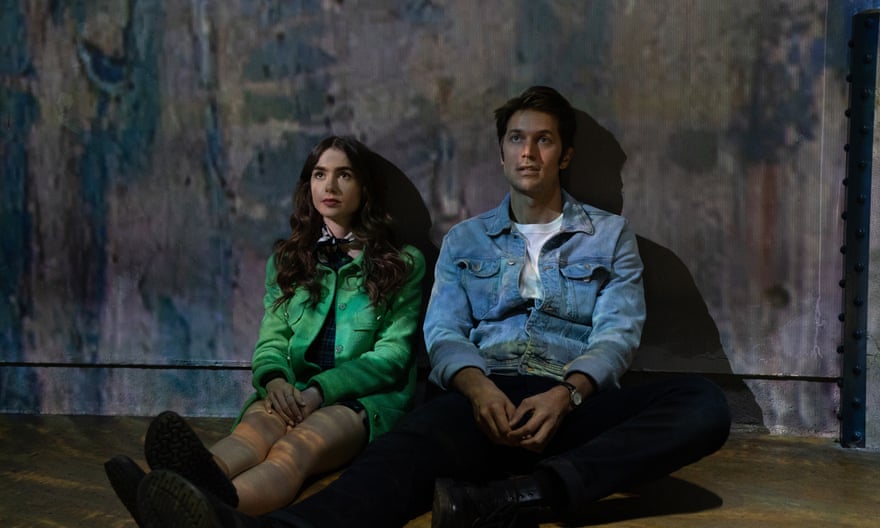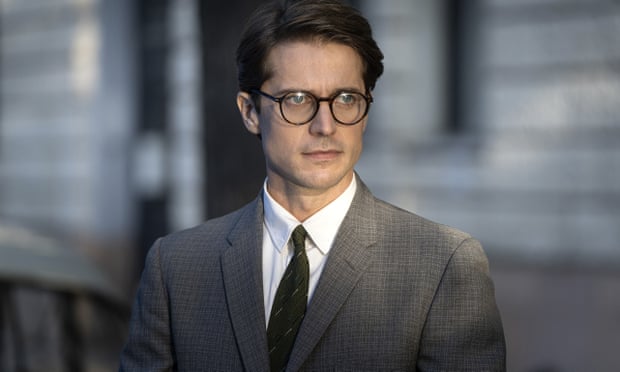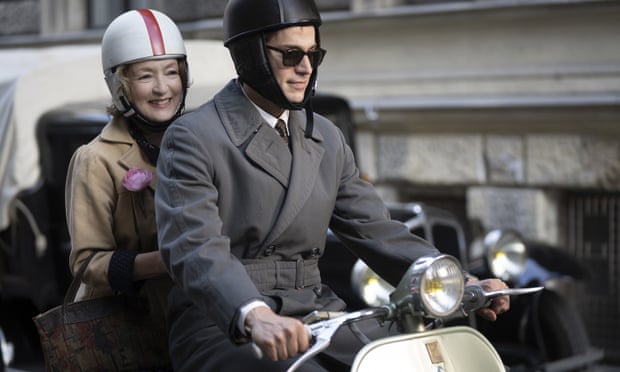Lucas Bravo, the French actor who shot to fame in 2020 playing Gabriel, AKA the “hot chef”, in Netflix’s Emily in Paris, would like to put a few rumours to bed. The first concerns his bank balance. “I saw on the internet the other day that my net worth is $1m,” he says, with incredulity. “Imagine! There’s this impression that you do just one project and have this visibility, and suddenly you have a house in the [Hollywood] hills and you’re set for life.” Another is that, prior to acting, his main job was modelling. Given the thirst that erupted on social media when he first appeared in Emily in Paris, this wouldn’t seem unlikely. “I am not a model,” he says firmly. “My parents did take me to an agency when I was 16, and I did one runway for Paul Smith, but the experience wasn’t for me. Fashion felt like a cold place and I was too sensitive for it.”
Bravo, 34, lives in Paris, though he is talking from a hotel in New York where, fresh from an appearance on a US chatshow, he is wearing a floral shirt. Set against the flowery wallpaper and matching floral curtains behind him, he has the appearance of having melted into the wall. “The shirt seemed like a good idea when it was given to me this morning but I didn’t know I was going to end up in this room,” he says, anxiously. “It’s, um, a lot of information.”
This month Bravo will appear in two movies: the first, Ticket to Paradise, features George Clooney and Julia Roberts as warring exes, though when I ask him about it, he says explaining his role amounts to a massive spoiler, so he’s been sworn to secrecy. “This is why I’m not in the trailer,” he says, with a hint of sadness.
He is, however, free to discuss the second project, Mrs Harris Goes to Paris, a determinedly old-fashioned, feelgood film set in the 1950s and starring Lesley Manville as a newly widowed cleaner who longs to own a couture dress. Chasing her dream, she must win over Paris’s snooty fashion mavens. Bravo plays André, a shy accountant who befriends her.
“I feel like this is the kind of lighthearted story we need right now,” says Bravo. “It’s about a woman operating out of love and trusting the universe. We often forget that this industry was invented for distraction and escapism, and that it’s fun to step into a movie theatre, be transported, and just turn off our brains for an hour or two.”
He adds that it’s refreshing to see a woman in her 60s at the centre of the story: “Putting aside the misogyny of the time, you have to remember that, in the 1950s, people of that age were considered to be near the end of their lives. Of course, the dress is really a metaphor, but she also wants the dress for the sake of having it. I like that about her, that she wants it just for herself.”
Bravo was delighted to have been cast not as “the boy next door”, as he describes his role in Emily in Paris, but a bona fide nerd. “André is a clumsy, solitary individual,” he notes. “He wears a suit and glasses, and is into numbers. He is oblivious to social interactions. He is the opposite of my Emily in Paris character and I love that contrast.”
Emily in Paris may not have turned Bravo into a millionaire, but it has made him exceedingly famous. The first series was streamed by 58m households in its first month. “I am super grateful for what Emily in Paris brought me and to [series creator] Darren Star for giving me a shot,” he says. “So wherever the writing goes, I am committed to it. I wouldn’t be here talking to you without it.”
What about the critical mauling it received on account of its portrayal of Parisians who chain smoke, drink wine for breakfast and let their tiny dogs crap on the streets? Bravo isn’t bothered. “People loved it or loved to hate it,” he says. “I defend it not just because it’s my project, but cliches are often cliches because they are rooted in truth. Of course, they are amplified through the vision of Darren: everything is bigger and bubblier and more colourful. But it’s his signature. It’s pure escapism, a fantasy world.”
What might seem like overnight success for Bravo is in fact the result of more than 10 years of graft. In his 20s, in between appearing in adverts and playing minor roles in French TV, he worked as a clothes shop assistant, waiter, bartender and supermarket shelf stacker. In that last job, he would arrive at 6am and spend two hours arranging biscuits on shelves.

When the role in Emily in Paris came along, Bravo was working as a real-life sous-chef. He says the newfound attention was discombobulating. “It took me probably two years to understand what it was. It is said that the moment you get famous is the moment you stop growing, as you start to see yourself through other people’s eyes instead of going into your own experiences. But now I feel at peace. I have strong anchors in my life with friends who I’ve known for decades, and with my family, so whatever happens outside of that doesn’t mean much to me.”
Bravo has previously spoken of his discomfort at being called a heart-throb and defined by his looks. Does he still feel that way? “As an actor you want to be taken seriously and show your range,” he says, after a pause. “You don’t want to be stuck in a niche. So when this very bubbly dramedy first came out, with this boy-next-door character, part of me felt I was getting further from my objective, which is to play challenging roles. But that was my initial perception, and I think I projected this more than I experienced it. Now I’ve done other jobs, I’ve been able to not take things so seriously.”
Bravo does come across as a serious soul and admits he is guilty of overthinking things. In a recent gap between filming commitments, he took himself on holiday. Where some people’s idea of a break is to lie on a beach, Bravo’s was to visit the north pole to watch scientists measuring the effects of global warming. “I’ve always had a strong connection to the environment,” he says. “It’s different when you’re there and you can see it. We saw polar bears that were skinny because their hunting surface is diminishing. You can feel the distress when you’re there on the ground.”

While he was in Queensland filming Ticket to Paradise he took some time out to see the landscape and immerse himself in nature. “It feels like everything is trying to bite you or poison you. But I was so impressed by how connected Australians are to nature. Not in a hipster way – they just know everything about their surroundings. I’ve always thought education should be revised, and that instead of making us learn dates of centuries-old battles, we should teach children to grow things, or how to heal themselves through natural recipes.”
Bravo’s fascination with film goes back to childhood. He would watch horror movies “because I wanted to see if I was strong enough to get through the movie alone. I watched Stephen King’s It when I was little and it traumatised me. My mother kept telling me: ‘Be careful what you feed your brain,’ and it took me a long time to understand what she meant. But I know now that film is like food for the brain. What you ingest defines your creativity and how you perceive and interact with the world.”
His father is Daniel Bravo, a well-known French footballer, which meant the family moved around a lot. By the time he was 14, Bravo had already lived in Nice, Lyon, Monaco, Marseille and Parma in Italy. He says it was tough to lose friends over and over again. “I was always surfing the wave of being the new guy. In my social interactions, I was a bit extra, a bit too much. I always thought: ‘I have to give everything to be accepted and fit in with this new group.’”
Nonetheless, it made him adaptable, which stood him in good stead for his future career. Bravo shied away from acting at first: “I saw a lot of people trying to get into it and thought to myself, ‘Why would I be any better than them?’” Now he finds it therapeutic. “I love the research into a character, as that gives me the tools to research and understand myself,” he says. “It brings you back to a state of contemplation, which is the opposite of what this world is providing right now. That’s got to be good, right?”
Mrs Harris Goes to Paris is in cinemas from 30 September; Ticket to Paradise is in cinemas from 16 September.

